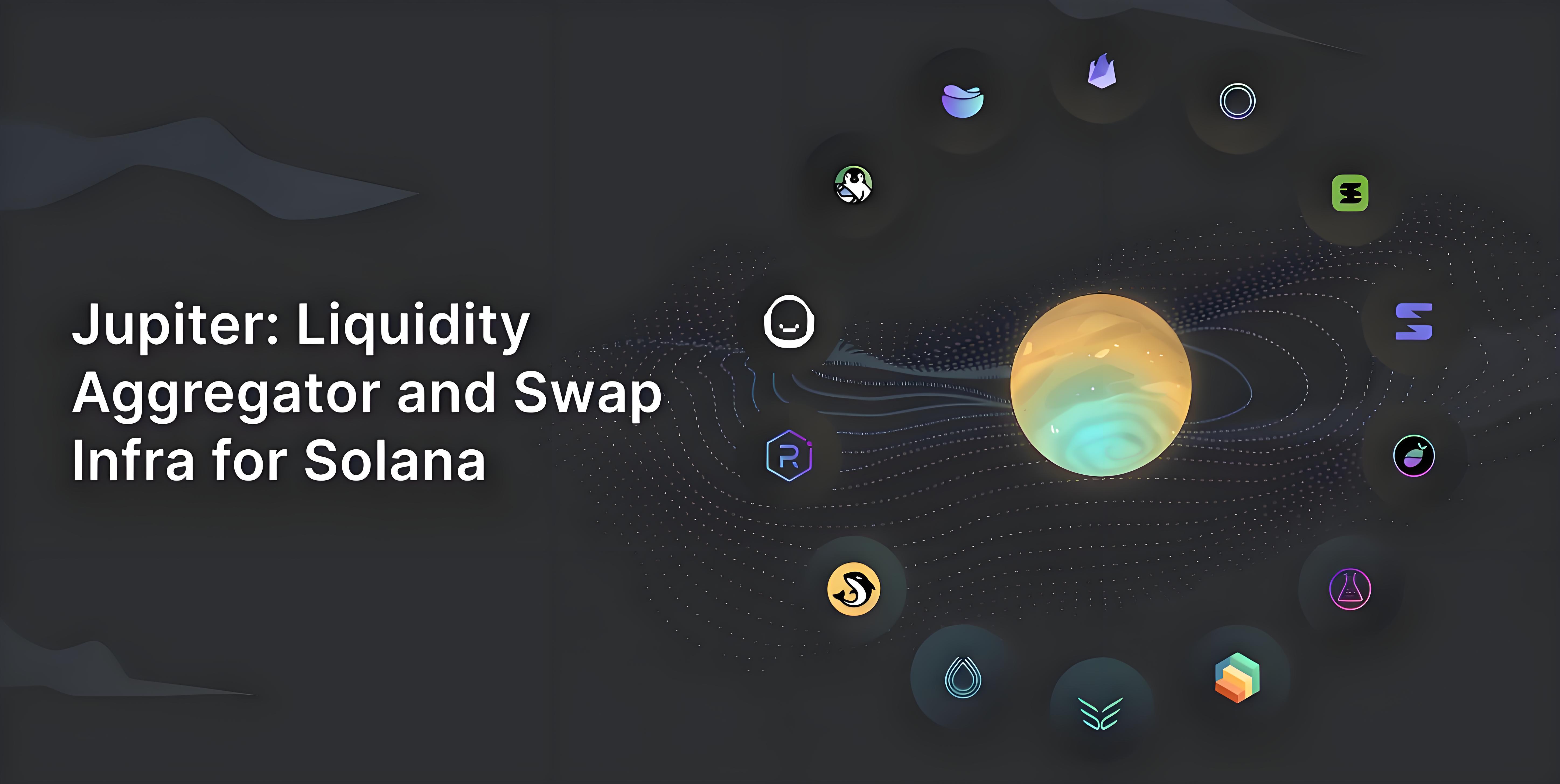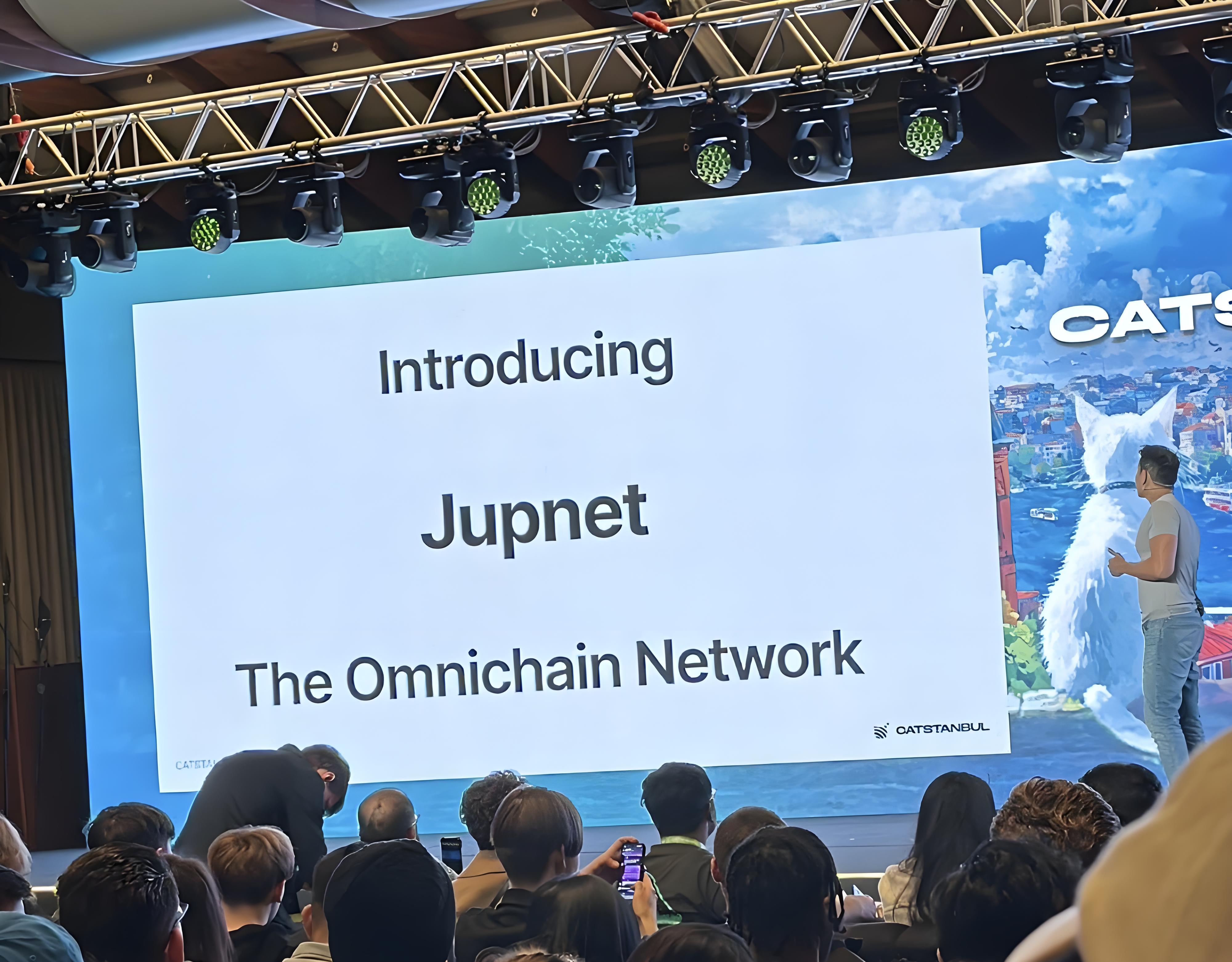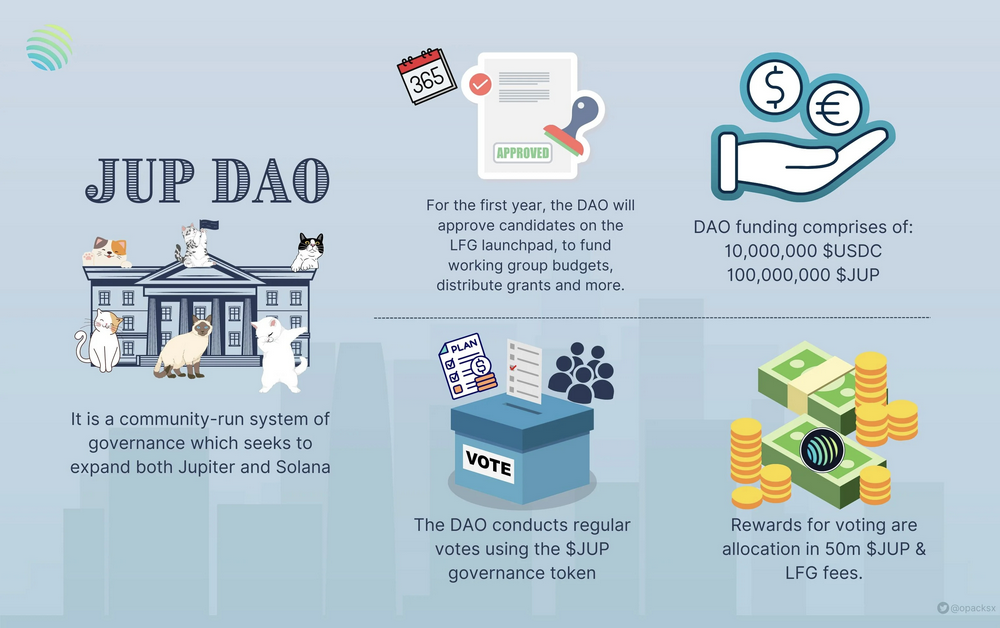
Article Hash (SHA1):
f1b3e93df4687ebfa91d4fc818bf9751f327d6ad04be85d263cdc9d0f69d5433
Number: Chain Source Technology PandaLY Hotspot Insights Broadcast No.011
Jupiter Exchange is a decentralized exchange (DEX) aggregator based on the Solana blockchain, dedicated to solving the liquidity fragmentation problem in the DeFi market and providing users with an efficient and transparent digital asset trading experience. Since its launch in 2021, Jupiter Exchange has quickly become an important part of the decentralized finance (DeFi) ecosystem. Recently, Jupiter announced the launch of the full-chain network Jupnet, taking a new step from initially focusing solely on aggregating Solana's liquidity to now planning to expand its goals to a broader ecosystem, creating a full-chain network. Founder Meow stated, "Now we will turn to the next major goal, aggregating everything." In addition, Jupiter has launched a brand new community website, jup.com, which will serve as an important information platform for the Jupiter community, providing the latest project updates from community DAOs to research forums and the Jupiverse project ecosystem.
1. What is Jupiter Exchange

The core function of Jupiter Exchange is to help users easily discover and obtain the best trading prices by aggregating data from multiple decentralized exchanges. Users can access multiple liquidity pools on a single interface, significantly improving trading efficiency while reducing trading costs. To meet the diverse needs of users, Jupiter has also introduced advanced trading features such as limit orders and dollar-cost averaging (DCA), which help it stand out in a competitive market.
As part of the ecosystem, Jupiter's native governance token JUP creates a decentralized community governance framework, encouraging user participation in platform decision-making and enhancing the sense of belonging and engagement within the community. Overall, Jupiter Exchange is committed to enhancing the accessibility and efficiency of DeFi through its flexible technical architecture, providing users with powerful trading tools and opportunities.
2. Jupiter's Technical Highlights

Jupiter Exchange has made in-depth innovations in its technical architecture and functions. Below, we will detail its four key features: “Swap,” “Limit Order,” “Dollar-Cost Averaging (DCA),” and “Value Averaging (VA).”
Swap Function
The Swap function of Jupiter is one of its core features, aimed at providing users with the best trading prices.
Liquidity Aggregation: By connecting with multiple DEXs within the Solana ecosystem, Jupiter aggregates liquidity from different trading pairs. When users exchange assets, the algorithm evaluates the prices and liquidity of each DEX in real-time, ensuring users obtain the lowest trading costs.
Metis is an important component of how Jupiter Swap works, utilizing a heavily modified Bellman-Ford algorithm to dynamically select the best trading path. Metis ensures seamless operation within Solana's ultra-fast block times and supports rapid trade execution through significant improvements to the backend infrastructure, effectively finding the most suitable trading routes even during periods of high market volatility.
To find the best price, Metis streams input tokens in real-time, gradually constructing routes for splitting and merging at any stage of the trade. This innovation allows users to discover better prices for more complex trades; for example, when a user wants to trade token A for token C, the system can consider multiple routes, such as A→B→C, to determine if a better price can be obtained. To enhance efficiency, Metis combines the route generation and quoting stages, ensuring the best price is provided while avoiding the generation of incorrect routes.
Limit Order Function
Limit orders are a type of trading order set by users through Jupiter Exchange, providing a flexible and efficient trading method that allows them to execute trades at preset prices under specific conditions. When placing an order, users specify the price at which they wish to buy or sell, and Jupiter continuously monitors on-chain prices using the Jupiter Price API to obtain real-time market data. When the on-chain price of SOL reaches the set conditions, the system automatically executes the limit order.
If the order size is too large and on-chain liquidity is insufficient, the system will strive to partially execute the order in chunks to ensure users can complete the trade with minimal market impact until the entire order is fulfilled. Once the order is executed, whether partially or fully, the system will automatically transfer the executed tokens to the user's wallet, ensuring users can quickly access their trading assets.
Additionally, users can flexibly set expiration times for limit orders. If an order is not executed within the specified time, the system will automatically cancel it and return the tokens to the user's wallet, thus avoiding unexpected market risks.
Jupiter's limit order function minimizes slippage risks caused by market volatility, ensuring users can still obtain the set trading price during fluctuations. Furthermore, placing orders using such orders ensures that trades will not fail due to market price fluctuations.
Dollar-Cost Averaging (DCA)
Dollar-Cost Averaging (DCA) is a widely used investment strategy, especially suitable for dealing with market volatility. In Jupiter Exchange, adopting the DCA strategy allows users to spread their investments over different times rather than investing a large sum in a single transaction, avoiding the risk of buying near peaks and helping to smooth out the user's overall cost.
Users can automatically configure the purchase amount at specified time intervals based on their investment plans. They only need to input the amount of tokens they wish to invest, the price range, and the investment time interval, and the system will automatically handle the rest.
Especially in bull and bear markets, users can buy more tokens at lower points through DCA and maximize returns over the long term by smoothing their cost basis, without worrying about when to enter the market. The automated investment process helps eliminate emotional decision-making caused by price fluctuations.
Value Averaging (VA)
Value Averaging (VA) is a strategy that adjusts investment amounts based on a target investment portfolio value, allowing users to flexibly change their investment amounts according to market conditions.
Unlike DCA, VA allows users to adjust their investment amounts based on market performance while setting investment goals. When asset prices fall below the target, users can increase their investment; conversely, they can reduce their investment when prices rise. This flexibility allows users to optimize their investment returns to the maximum extent.
By using VA, users can automatically adjust their contributions over the long-term investment process, enabling them to seize market lows, thereby reducing their overall cost basis and facilitating the locking in of higher asset values when the market rises.
3. What is the upcoming Jupnet?

Jupnet is a full-chain network designed to aggregate all cryptocurrencies in a centralized manner, connecting multiple blockchains to enhance the user and developer experience, making transactions smoother.
Jupnet is driven by three main systems:
- DOVE Network: This is a centralized front-end machine responsible for the verification and execution of transactions, addressing the single source of truth issue in the current cross-chain environment. The design of the DOVE network ensures that multiple chains can synchronize to achieve consistency, thereby improving the security and efficiency of transactions.
- Full-Chain Ledger Network: This network can host a full-chain ledger across multiple chains, allowing users and applications to trade freely in a decentralized manner. It implements the concept of dynamic finality, facilitating the rapid processing of transactions based on transaction scale and circumstances while simplifying complexity for developers.
- Aggregated Decentralized Identity (ADI): Jupnet adopts a more user-friendly authentication system, replacing traditional wallets to provide users and developers with an optimized access experience. By bringing the authentication framework on-chain, users can better control and manage their assets, enhancing security and recovery capabilities.
The goal of Jupnet is to become the infrastructure for a globally unified market, connecting all possible trading assets and services. In the coming months, Jupnet will launch its first public beta version, continuing to drive the advancement of decentralized finance.
4. Jupiter DAO and JUP Token Economics

Jupiter DAO is a decentralized autonomous organization closely related to Jupiter Exchange, aimed at enabling user participation in the platform's decision-making process through community governance mechanisms. The establishment of Jupiter DAO reflects the core philosophy of decentralized finance (DeFi), where the JUP token plays a crucial role in the governance framework, providing holders with voting rights and decision-making power in project development.
Recently, Jupiter Exchange distributed 700 million $JUP tokens to 2.3 million eligible wallets, valued at over $590 million. This large-scale token distribution not only increased community engagement but also significantly enhanced the liquidity of the token, accelerating the project's development.
The total supply of JUP tokens is set at 10 billion, with a substantial portion allocated to community members through airdrops and incentive programs. This distribution method not only promotes active user participation but also ensures the liquidity of the tokens. Additionally, users holding JUP tokens not only have the right to participate in important platform decisions but can also earn additional rewards through staking and other means. This mechanism effectively incentivizes users to hold and use JUP long-term, establishing a stable foundation for community participation. The specific token distribution structure is as follows:
- 40% — Community Growth and Airdrops: Used to incentivize community development, including airdrop activities and other community incentive programs, aimed at attracting more users and enhancing project activity.
- 20% — Token Sales: Allocated through token sales to raise funds to support further project development.
- 40% — Insiders and Strategic Reserves: Distributed to the project team, advisors, and strategic reserves to ensure the project's ongoing operation and long-term development.
Jupiter DAO allows users to participate in key governance decisions by holding JUP tokens. The system adjusts voting weight based on user participation and token holdings, ensuring that active users have influence in the decision-making process. Token holders can vote on important matters such as the introduction of new features, allocation of ecosystem funds, and development of potential projects. By introducing a community voting mechanism, Jupiter ensures transparency and fairness in the decision-making process, driving genuine project development. Community members can vote on proposals, guiding the future development of the platform. This governance structure not only enhances the sense of community participation but also ensures that the platform can quickly respond to user needs and market changes, more clearly identifying and addressing the real issues faced by users.
Recently, Jupiter launched a brand new community website, jup.com, which is now open for user registration. This website will serve as an information aggregation platform for the Jupiter community, centralizing all the latest project updates in one place, thereby enhancing interaction among community members and building a fully user-driven decentralized DeFi ecosystem.
Conclusion
The decentralized trading features in Jupiter Exchange paint a promising blueprint for the future development of the Solana ecosystem. By aggregating liquidity and providing diverse trading tools, it enables users to complete transactions more efficiently. The upcoming Jupnet will further expand this vision, allowing various crypto assets to interconnect, driving innovation and development across the entire DeFi space, and scaling up DeFi as a whole, promoting more financial activities and transactions.
In a rapidly evolving and diverse crypto market, flexibility and innovation will be key to achieving success. Against the backdrop of changing user demands, Jupiter must continuously optimize platform functionality and security to ensure the long-term robust development of the ecosystem. Although the road ahead is long and challenging, each innovation and advancement in blockchain projects lays the foundation for the future of decentralized trading, realizing broader applications of cryptocurrency.
免责声明:本文章仅代表作者个人观点,不代表本平台的立场和观点。本文章仅供信息分享,不构成对任何人的任何投资建议。用户与作者之间的任何争议,与本平台无关。如网页中刊载的文章或图片涉及侵权,请提供相关的权利证明和身份证明发送邮件到support@aicoin.com,本平台相关工作人员将会进行核查。




